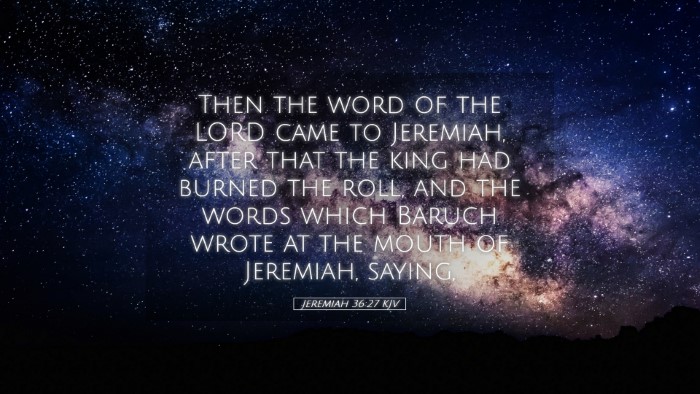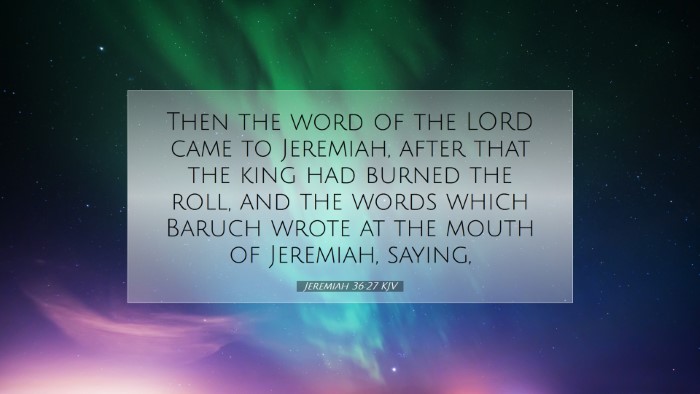Commentary on Jeremiah 36:27
Jeremiah 36:27 states: "Then the word of the Lord came to Jeremiah, after that the king had burned the roll, and the words which Baruch wrote at the mouth of Jeremiah, saying," This verse is situated within the broader context of Jeremiah's prophetic ministry and his interactions with the kings of Judah. This commentary aims to elucidate the meaning of this verse by drawing upon insights from various public domain commentaries, particularly those of Matthew Henry, Albert Barnes, and Adam Clarke.
Contextual Overview
To understand Jeremiah 36:27 effectively, it's crucial to explore the events leading to this declaration. The chapter describes King Jehoiakim's response to the scroll containing the words dictated by God to Jeremiah. When the king orders the scroll to be read, he reacts with disdain, ultimately burning it in defiance of God's message.
Insights from Matthew Henry
Matthew Henry provides profound insights into this verse by emphasizing the resilience of God's word despite human opposition. He notes that:
- Divine Authority: The verse highlights that God's word comes directly to His prophets, indicating that Jeremiah is not merely speaking on his own behalf but is a mouthpiece for divine revelation.
- God's Sovereignty: Even after Jehoiakim's act of burning the scroll, God’s purposes remain unaltered. Henry asserts that this is a profound testament to God's sovereignty; no act of defiance can thwart His plans.
- Consequences of Rejection: Jehoiakim's rejection of God’s word serves as a warning to all leaders who ignore divine counsel. Henry emphasizes that such actions bring severe consequences.
Albert Barnes' Perspective
Albert Barnes offers a detailed exegetical approach to the verse. He explains that:
- Revelation Continuity: Barnes highlights that the word coming to Jeremiah indicates God's commitment to His messages. Even after attempts to silence His voice, God continues to reveal His will.
- Judgment and Mercy: Barnes underscores the duality of God's character as He balances judgment with mercy. Despite the king's actions, God still reaches out to warn and instruct His people through the prophet.
- Historical Context: The historical backdrop of Jehoiakim’s reign, filled with rebellion against God, emphasizes the need for prophetic voices to speak truth into a corrupt society.
Commentary by Adam Clarke
Adam Clarke's commentary provides theological reflection on God's communication with His people. Clarke asserts that:
- Nature of Prophecy: The verse illustrates the nature of prophecy. Clarke articulates that the prophetic word is essential for God's people, and its preservation is of utmost importance.
- Human Rejection: The burning of the scroll signifies humanity's persistent rejection of God's message. Clarke eloquently stresses that God’s efforts to reach the hearts of men are often met with hostility.
- Perseverance of Scripture: Clarke reminds readers that despite attempts to eliminate it, scripture perseveres. God's word lives on in various forms and remains accessible for guidance.
Reflection on the Significance of the Verse
In examining Jeremiah 36:27 through the lenses of these esteemed commentaries, several themes emerge that are relevant for pastors, students, theologians, and Bible scholars:
- The Indomitable Word of God: This verse assures us that God’s word cannot be extinguished. It serves as a reminder that no earthly power can undermine the divine truths of scripture.
- Call to Leadership: Leaders are called to heed God's warnings and counsel. The consequences faced by Jehoiakim serve as a timeless reminder for those in authority to respect divine instruction.
- Continuity of Divine Communication: God’s ongoing communication with humanity is pivotal. The continuous revelation serves as an encouragement for believers to remain open to God's word, even in challenging times.
- Perseverance in Ministry: For pastors and ministers, this verse emphasizes the need for steadfastness in proclaiming God’s message, regardless of societal pushback.
Conclusion
Jeremiah 36:27 is a powerful reminder of the nature of divine revelation and human response. Through the lenses of Matthew Henry, Albert Barnes, and Adam Clarke, we glean insights that encourage faithfulness to God's word. This verse underscores the enduring nature of scripture and the imperative for leaders to submit to divine counsel. As such, it serves as both a cautionary tale and a testament to the relentless pursuit of divine truth.


